The Zambian Government is planning a major road infrastructure programme, in a bid to boost the country’s connectivity and help continue with its economic growth. The country has established the Link Zambia 8000 project, which is being carried out in a series of phases. The first phase will include the upgrade of some 2,290km of roads and could cost in the region of US$1.5 billion to implement. The World Bank is currently evaluating plans for the second phase of the project. Funding sources have yet to be r
September 15, 2014
Read time: 1 min
The Zambian Government is planning a major road infrastructure programme, in a bid to boost the country’s connectivity and help continue with its economic growth. The country has established the Link Zambia 8000 project, which is being carried out in a series of phases. The first phase will include the upgrade of some 2,290km of roads and could cost in the region of US$1.5 billion to implement. The World Bank is currently evaluating plans for the second phase of the project. Funding sources have yet to be revealed, however the aim of the project is to boost connectivity. Zambia’s copper mining industry has been a major contributor to the country’s GDP, however poor road links to many of the mining areas have hampered shipments of heavy equipment and materials.







